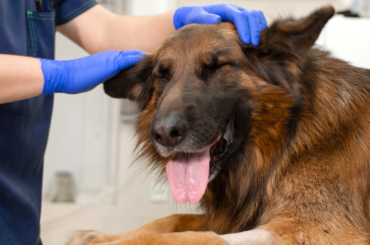Welcoming a German Shepherd puppy into your home is an exciting and rewarding experience. As a responsible pet owner, ensuring your puppy receives the right nutrition is crucial for their growth, development, and overall well-being. German Shepherd puppies have specific dietary considerations that require attention to support their unique breed characteristics. In this comprehensive guide, we’ll explore the key aspects of feeding German Shepherd puppies, from choosing the right food to establishing a proper feeding schedule.
- Understanding German Shepherd Puppy Growth:
German Shepherds are known for their intelligence, loyalty, and versatility, but these qualities come with specific growth patterns. Understanding the breed’s growth trajectory is essential for tailoring their diet accordingly.
German Shepherd puppies typically grow rapidly during their first year, with the majority of their growth occurring in the first six months.
They reach their adult size around 12 to 18 months. This rapid growth phase requires a diet that supports their developing muscles, bones, and organs.
- Selecting the Right Puppy Food:
Choosing the right puppy food is paramount for ensuring your German Shepherd puppy receives the necessary nutrients for healthy development.
Look for high-quality, commercially available puppy food specifically formulated for large breeds.
These formulations consider the unique nutritional needs of larger breeds like German Shepherds, providing a balance of essential nutrients in appropriate proportions.
- Protein Content: Opt for puppy foods with a higher protein content to support muscle development. Look for sources like real meat (chicken, beef, or lamb) listed as the primary ingredient.
- Calcium and Phosphorus: These minerals are crucial for bone development. Ensure the puppy food has an appropriate balance of calcium and phosphorus to support the formation of strong and healthy bones.
- DHA for Brain Development: Docosahexaenoic acid (DHA) is an omega-3 fatty acid that aids in brain development and vision. Many high-quality puppy foods include DHA to support cognitive function.
- Digestible Carbohydrates: Choose puppy foods with easily digestible carbohydrates, such as brown rice, sweet potatoes, or oatmeal. These provide energy for your active puppy.
- Avoid Fillers and Artificial Additives: Steer clear of puppy foods with excessive fillers, artificial colors, flavors, and preservatives. Look for natural and wholesome ingredients.
- Feeding Schedule for German Shepherd Puppies:

Establishing a consistent feeding schedule is vital for promoting healthy eating habits and regulating your German Shepherd puppy’s metabolism. Puppies typically need to eat more frequently than adult dogs due to their smaller stomachs and higher energy needs. Here’s a suggested feeding schedule:
- Up to 8 Weeks: Puppies may still be with their breeders or in a shelter. Follow the feeding guidelines provided by the breeder or shelter.
- 8 to 12 Weeks: Aim for four meals a day, spaced evenly throughout the day. This frequent feeding helps meet the high energy demands of growing puppies.
- 3 to 6 Months: Gradually reduce the number of meals to three a day. Adjust the portion sizes based on your puppy’s weight and activity level.
- 6 to 12 Months: Transition to two meals a day. Continue to monitor your puppy’s weight and adjust portions accordingly.
- Monitoring Your Puppy’s Growth:
Regularly monitoring your German Shepherd puppy’s growth is essential for ensuring they develop at a healthy pace. While it’s normal for German Shepherds to be larger than some other breeds, excessive or rapid growth can contribute to skeletal issues. Keep the following considerations in mind:
- Weight Management: German Shepherd puppies should gain weight steadily but not too rapidly. Consult with your veterinarian to determine the appropriate weight range for your puppy’s age and breed.
- Body Condition: Assess your puppy’s body condition regularly. You should be able to feel their ribs with a slight covering of fat but not see them prominently. Consult your veterinarian if you have concerns about your puppy’s body condition.
- Joint Health: German Shepherds are prone to joint issues, so it’s crucial to monitor their joint health. A balanced diet with appropriate levels of calcium and phosphorus supports healthy bone development.
- Veterinary Check-ups: Schedule regular veterinary check-ups to ensure your puppy is on track with their growth and development. Your veterinarian can provide guidance on nutrition, weight management, and any specific health concerns.
- Transitioning to Adult Food:
As your German Shepherd puppy approaches their first birthday, it’s time to consider transitioning them to an adult dog food formulated for large breeds. Gradual transition over a week or two helps avoid digestive upset. Adult dog food continues to provide the essential nutrients your German Shepherd needs, but with adjusted levels suitable for their mature stage of life.
- Consult Your Veterinarian: Before transitioning to adult food, consult with your veterinarian. They can assess your dog’s individual needs and recommend an appropriate adult dog food.
- Adjust Portions: With the switch to adult food, adjust the portion sizes to meet your dog’s maintenance energy requirements. Monitor their weight and make adjustments as needed.
- Special Considerations and Supplements:

Depending on your German Shepherd puppy’s individual health needs, your veterinarian may recommend specific supplements or dietary modifications. Common considerations include:
- Joint Supplements: German Shepherds are prone to joint issues like hip dysplasia. Joint supplements containing glucosamine and chondroitin may be beneficial for maintaining joint health.
- Omega-3 Fatty Acids: Omega-3 fatty acids support skin health, coat condition, and cognitive function. Some puppy foods already contain DHA, but additional omega-3 supplements may be recommended.
- Food Allergies: Monitor your puppy for any signs of food allergies or sensitivities. If they exhibit symptoms like itching, gastrointestinal upset, or skin issues, consult with your veterinarian to identify potential allergens and make appropriate dietary adjustments.
Conclusion:
Feeding a German Shepherd puppy involves careful consideration of their unique growth patterns and nutritional requirements. By selecting a high-quality puppy food, establishing a consistent feeding schedule, and monitoring their growth and health, you set the foundation for a healthy and happy future. Regular veterinary check-ups provide opportunities to discuss your puppy’s diet, address any concerns, and ensure they are thriving at every stage of their development. With proper nutrition and care, your German Shepherd puppy will grow into a strong, vibrant adult companion.






